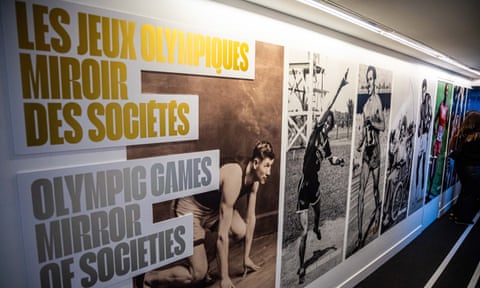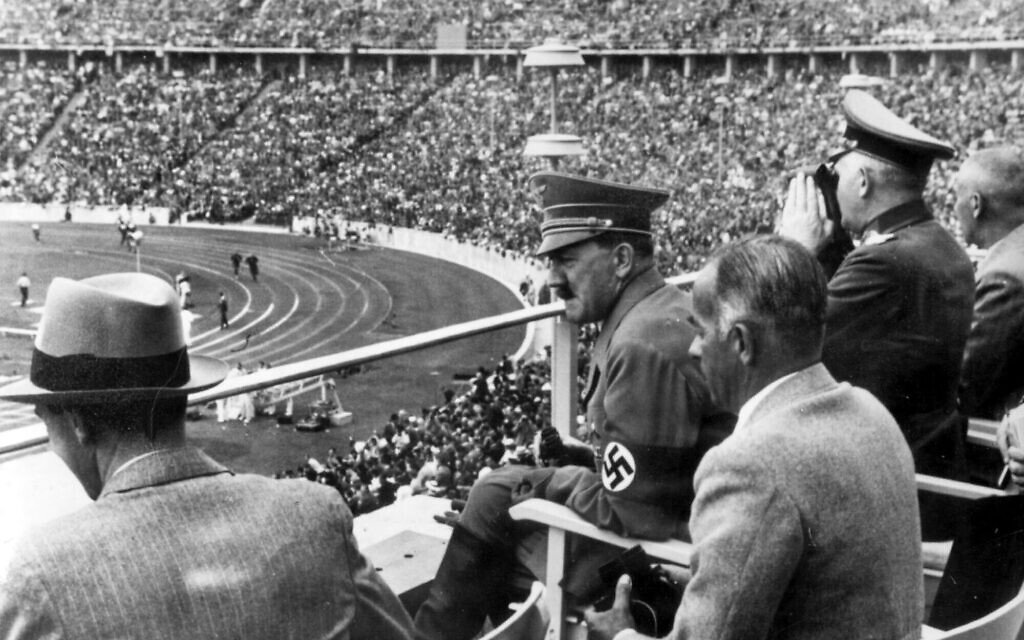International Olympics Committee: Games 'Mirror of Society'
"This exhibit tries to show ... this relationship between ideology, power and the Olympic Games.""[The exhibit's purpose is to show the historical and political significance of the Olympics] through the life of big stars or champions like Alfred Nakashe, who was a Jew from Algeria competing in swimming and who was deported to Auschwitz [concentration camp during the Second World War. Nakashe competed with the French team in Berlin in 1936 and in the first postwar Summer Olympics in London in 1948 after surviving the Holocaust].""So the Olympic Games of Paris are a huge moment, because we will see if the peace values will be respected.""We'll see if sports can be also a way of spreading universal democratic values."Historian Paul Dietschy, Mirror of our Societies Exhibit, show curator"The 1936 Games are emblematic with Jesse Owens' story, because he is both an immense champion who left his mark on the history of sport ... but also because of his personality, his career, his close ties to German champion Luz Long.""Owens embodies this struggle to confront Hitler and the Nazi ideology ... But he himself was a victim of racism and segregation in the United States."Historian Caroline Francois, show curator
 |
| Emmanuel Macron has said Russia will be asked to observe a ceasefire in Ukraine during the Games. Photograph: Christophe Petit-Tesson/EPA |
History
has shown the Olympics as an international forum of competitive sports
excellence, but they have also been seen, and used as a powerful
political stage used by totalitarian regimes as a tool for propaganda,
while on the other hand, athletes themselves have used their presence on
the world stage in competitive sports at its optimum level, as a driver
of change against racial inequalities and injustice.
An
exhibit is scheduled to be unveiled in Paris prior to this summer's
Paris Olympics which intends to demonstrate through its focus on past
events, that the games have been a 'mirror of society' reflecting issues
at the fore in human relations, since the beginning of the 20th
century. The exhibit is to be housed at the Shoah Memorial [Holocaust
Memorial], located in central Paris, featuring photographs, documents
and Olympic items, along with film archives from the past century.
Its
opening date was March 29, and the exhibit will be available for
viewing until mid-November. The 1936 infamous Berlin Olympics is
highlighted as the tool it was for Nazi Germany for its bleak, black
propaganda features. Also featured is the Mexico Olympics of 1968 where
Tommie Smith and John Carlos -- Black sprinters -- raised their fists to
protest racial injustice in the United States.
 |
| Two West German border police helicopters that carried armed terrorists and their nine Israeli Olympian hostages, stand at Fuerstenfeldbruck air force base, twenty miles west of Munich, Germany, on September 7, 1972. (AP Photo, File) |
The
scene of a brutal attack on eleven Israeli Olympic team members,
murdered by Palestinian 'Black September' terrorists at the 1972 Munich
Olympics serves as a haunting bookend to Hitler's 1936 Olympic event.
Athletes who embody Olympic values like Jesse Owens, the American Black
athlete who won four Olympic gold medals in Berlin -- to the Nazi
Regime's extreme discomfort -- are featured as athletes who embody
Olympic values.
The
issue of Olympic stadiums transformed into internment camps during the
Second World War is also addressed. In the wake of the Nazi invasion of
France in 1940, the succeeding collaborationist Vichy government has its
own place in the exhibition. Photographs of the Vel d'Hiv stadium
outside of Paris, when French police ordered13,000 French Jews to
assemble within the stadium that had been a venue for boxing, wrestling
and weightlifting during the 1924 Paris Olympics.
The
expectation is that at the Paris Olympics of 2024, international
politics will again be on the agenda. Earlier this month the
International Olympic Committee announced that Russian and Belarusian
athletes will not be permitted to be part of the traditional parade in
the French capital's opening ceremony. Both Russia and Belarus have been
barred from team sports, reflecting Moscow's war on Ukraine.
Israel,
on the other hand, faces no threat to its Olympic status, while in the
throes of the Israel-Hamas Gaza war, explained IOC President Thomas
Bach. "Since the heinous attack on the Israeli team [during the 1972 Munich
Olympics], there were always special measures being taken with Israeli
athletes."
 |
| From left to right, Dr. Joseph Goebbels, German Chancellor Adolf Hitler, Reichs Sports Leader Hans von Tschammer und Osten and General Field Marschall Werner von Blomberg observe the Olympic Games in Berlin, Germany in August 1936. (AP Photo, File) |
Labels: 2024 Paris Olympics, Human Rights, Mirror of Society, Olympic Games, Olympic Medal Winners, Politics and the Olympics

<< Home